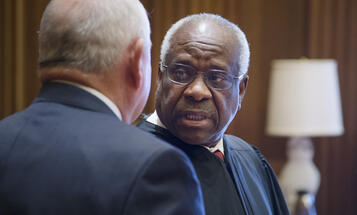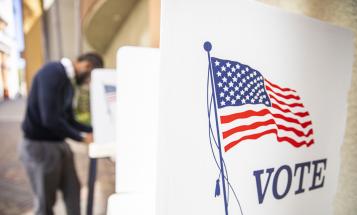
After Super Pac Tuesday: Dominant Donors, Apathetic Voters
Republicans voters aren’t hugely enthusiastic about any of their choices because they didn't choose these candidates — donors did.
 The outcome of Super Tuesday confirmed what we already know: Republicans voters aren’t hugely enthusiastic about any of their choices this primary season.
The outcome of Super Tuesday confirmed what we already know: Republicans voters aren’t hugely enthusiastic about any of their choices this primary season.
And in even worse news for Republicans, independent voters now hold very negative views of the GOP candidates -- as a new Washington Post–ABC News poll shows. According to the Post:
Texas Rep. Ron Paul does best with a 38 percent favorable rating and a 35 percent unfavorable rating. Former Massachusetts governor Mitt Romney, the frontrunner in the race, clocks in at a dismal 32percent favorable score, 16 points lower than the 48 percent of independents who see him in an unfavorable light. Ditto former Pennsylvania senator Rick Santorum who is viewed favorably by just three in 10 independents. That looks positively outstanding when compared to the 21 percent -- yes, 21 percent -- of independents who view former House Speaker Newt Gingrich favorably.
Who or what is to blame for the lackluster numbers?
The answer is Super PACs — but not for reason you might be thinking.
It’s easy to say that Republicans and Independents have turned sour on the candidates because of a bloody primary season of candidate-specific Super PACs beating up on opponents. It’s true that the public is disgusted by the amount of negative advertising; and that in spite of the Supreme Court’s delusions, the general public does not believe Super PACs are truly independent of the candidates they support, and so likely blames the candidates for much of the negativity.
However, there is a more fundamental problem that explains much of the disconnect between the Republican candidates and the rank-and-file voters: The fact is, voters did not choose these candidates — donors did.
It has become clear over the course of this primary season that a candidate’s Super PAC’s prowess in knocking down the competition is key to staying in the race. Yet a recent U.S.PIRG/Demos study found that of all itemized contributions to Super PACs, 96 percent came in contributions of $10,000 or more from just 1097 donors.
Let us say that another way: the equivalent of 0.000351 percent of the population of the United States (or just 35 of every 10 million Americans) has given 96 percent of the money determining who stays and who goes in the Republican primary.
Is it any wonder that those headed to the polls yesterday were not exactly gushing with enthusiasm for candidates who were hand-picked for them by a tiny group of wealthy donors?
A world where candidates actually had to rely on small contributions, contributions that every American household could afford to make if they so choose, could look quite different. Either the current crop of Republican candidates would have spent more timetalking about the issues that really matter to rank-and-file Republicans and Independents rather than the issues that really matter to Sheldon Adelson and Foster Friess; or voters would be casting their ballots for an entirely different set of Republican candidates.
Either way, it’s safe to assume that voters would have been more excited about going to the polls yesterday.
Just another reason that leaders on both sides of the aisle should be working to overturn Citizens United and end our big money system.



